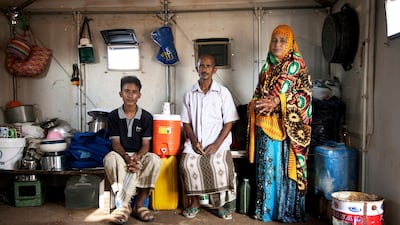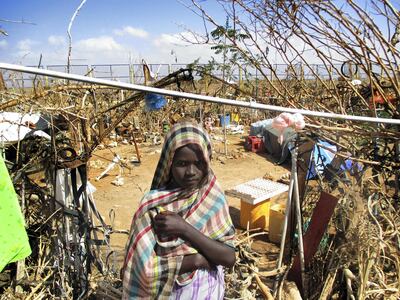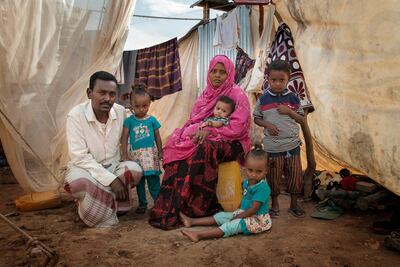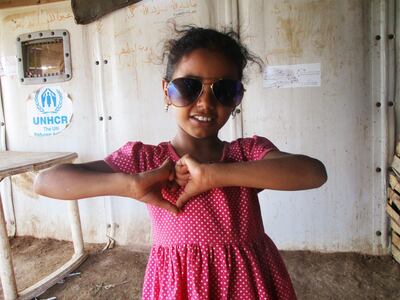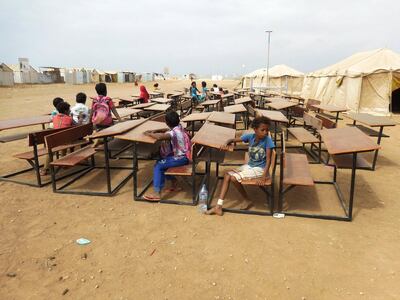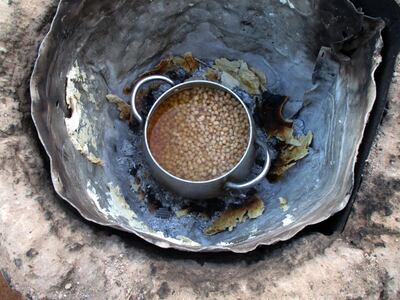“Refugees are usually depicted as not having voices or as needing to be spoken for,” says Nathalie Peutz, a professor of anthropology at New York University Abu Dhabi who studies migration on the Horn of Africa. In response, Peutz developed a collaborative research project that examined how we communicate the stories of refugees.
Peutz paired up with photographer Nadia Benchallal to give cameras to migrants to document their lives in the Markazi refugee camp in Djibouti. In the course of a year, she and Benchallal visited Markazi four times – the last with 15 students from NYU Abu Dhabi.
Peutz describes an experience at one of the camps that she visited last month with the students. "When we took them to a Somali camp, a guy came up to one of the students and said: 'You are just taking pictures of us and you are leaving, what are you doing for us?' The students were a little embarrassed and taken aback, but it's exactly what I wanted them to hear. What would it be for us to take pictures and take them somewhere else and say we're helping these people, if they're not involved in telling their own narrative?"
Peutz and Benchallal, who is French of Algerian origin, focused on the camp of Markazi, where many of refugees had come from Yemen. They say that their unlikely pairing – two women, one Arabic in appearance, the other Arabic-speaking – made them non-threatening to those in the camp and helped establish a feeling of trust. They gave cameras to 10 people in the camp and asked them to document their own lives.
When Benchallal returned a few months later, she led photography workshops and shadowed some of the aspiring photographers, giving them technical advice on shooting and editing, and on how to tell a story visually.
Benchallal, who also took pictures of the migrants, was surprised by how the refugees chose to document their lives. “I never thought of taking a picture of just the inside of the tent, but one of the women wanted to show the packages in the kitchen, how everything is decorated,” she recalls. “These images show that we are here, but just for a moment. We won’t live here for all our life; we don’t want to live here for all our life.
“Another did a story on night, because night is very particular. Electricity comes on around 6.30pm, and only lasts for two or three hours.”
The participants' images were the first to be exhibited during the project, in a show Peutz and Benchallal staged inside the camp. These images were also shown later at the French Institute in Djibouti City. Peutz and Benchallal brought some of the migrants to view. "It was important," Peutz says, "that the participants saw their images first." These images are now up in the show Markazi at NYU Abu Dhabi, alongside Benchallal's photographs of the camps and reminiscences from the NYU Abu Dhabi students about the experience. A parallel show is also up in New York of some of the images, at 19 Washington Square North, an exhibition space at New York University.
For Benchallal, a news photographer who had never visited Djibouti before, her main goal was to communicate the dignity of the people. "When there's a conflict," she notes, "the main issue is the family, which is what I chose to focus on." The resulting images look staged, almost like turn-of-the-20th-century images, when subjects had to stand still for long periods to let sufficient light through the camera's aperture.
In one, a woman sits flanked by her husband and children, with a child reclining in her lap. Their faces are impassive: they show neither the hardships of life in a refugee camp nor the conventional smiles of family photographs – another link, perhaps, to the timelessness these images evoke. When she and Peutz returned on one of their visits, they gave the families printed copies of the images, and the importance of these documents was remarkable.
“People had them framed; hung them in the tent,” Benchallal says. “There was the preciousness, not of the picture, but of remembering who they are and where they have been through in this time.”
Asma Balfaqih, an Emirati-Yemeni NYU Abu Dhabi student who grew up in the UAE, travelled to Djibouti as part of Peutz's university course The Other Crisis: Migration and Displacement Along the Red Sea. The students participated in language courses with the refugees, made crafts and played sports; they learnt from the refugees just as the refugees learnt from them, she says.
“It was clear the photographs were an escape for them,” Balfaqih explains. One older man ran a grocery store and had pinned all the photographs he had taken on large pieces of cardboard that he displayed around his shop. “You could tell this made him think: ‘I’m not just a refugee, I can be a photographer’,” she says. “I can capture these moments and be part of this bigger moment.”
The exhibition runs at NYU Abu Dhabi's Project Space until February 27. Nathalie Peutz's research project was supported by NYU Abu Dhabi; NYU Abu Dhabi's centre for photography, Akkasah, provided additional funds for Nadia Benchallal and the exhibition
_________________
Read more:
Serge Attukwei Clottey shows Dubai how he disrupts the art trade
London’s V&A exhibition showcases opulent ocean liners from the 19th and 20th century
_________________
